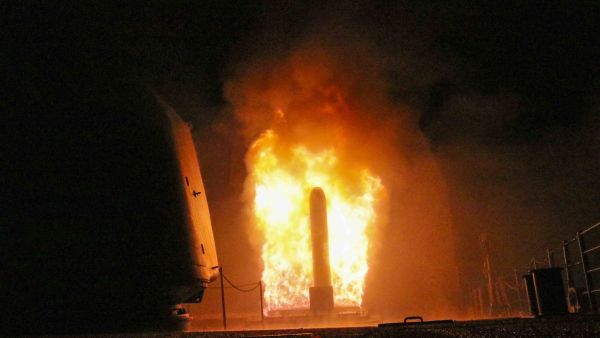ALBAWABA - Donald Trump, the President of the United States, has decided not to give Ukraine Tomahawk cruise missiles. This shows that he doesn't want to get the U.S. more involved in the war with Russia. The i Paper says that the decision came after a meeting at the White House with Ukrainian President Volodymyr Zelensky that was very important.
The Tomahawk missile could hit targets up to 2,500 kilometers away and is very accurate. It would have put Moscow and almost 2,000 Russian military bases within Ukraine's reach. Reports say that U.S. officials warned that this move could lead to a big rise in the war.
Just days before the meeting, Trump told reporters on Air Force One on the way to Israel that he might think about sending Tomahawks to Kyiv if the conflict didn't end. At the time, he said, "I could send them Tomahawks if this war doesn't end."
But after talking with Zelensky in Washington, Trump seemed to change his mind and say that he hoped the war would end without the use of advanced U.S. missiles.
People who know about the talks say that Trump became sure that giving Tomahawks to Ukraine would lead to a direct conflict between the US and Russia, something he has tried to avoid at all costs.
Russia Says There Will Be "Nuclear Consequences"
The Kremlin was very upset by reports that the U.S. might send weapons to Ukraine. Dmitry Medvedev, who used to be the president of Russia, said that Moscow couldn't tell the difference between nuclear and regular Tomahawk missiles. This meant that any launch could lead to a nuclear response.
Dmitry Peskov, a spokesman for the Kremlin, called the idea "extremely dangerous" and said: "We can't know if a long-range missile is coming toward us with a nuclear warhead. What should Russia do?
Moscow also said that giving Ukraine Tomahawks would be a "critical escalation" and could end peace talks that are already going on.
Zelensky: "We chose not to escalate."
After the meeting at the White House, President Zelensky said that he and Trump had talked about long-range weapons but agreed not to say anything.
Zelensky told reporters that the US doesn't want things to get worse, and he called his view on the matter "realistic."
Experts say that the Ukrainian leader seemed to agree that the risk of nuclear war was greater than the possible military gains.
"Not America's War"
Tony Brenton, who used to be the British ambassador to Russia, says that Trump's refusal is in line with his long-held belief that the war in Ukraine is Europe's problem, not America's.
"Trump thinks it's time for Europe to take on most of the responsibility for arming and funding Ukraine," Brenton said, adding that Trump's "America First" policy still guides U.S. foreign policy.
Trump agreed with this, saying that the U.S. couldn't "drain" its small stock of Tomahawk missiles. "We need them too," he told the press. "I don't know what we can do about that."










